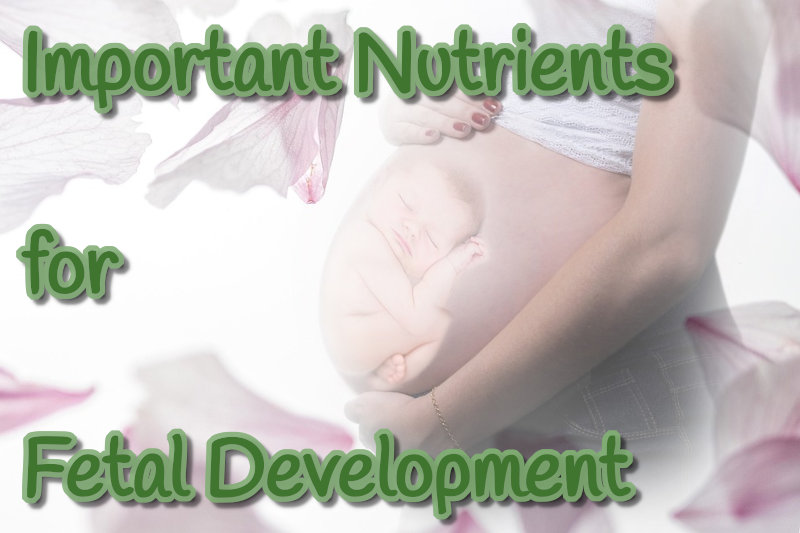Important Nutrients for Fetal Development

December 28th, 2024 | Pregnancy
Do You Know the Important Nutrients for Fetal Development
A mother’s diet is critical in the health and development of an unborn child during pregnancy. Adequate nutrition supports the growth of the fetus, while also actively preventing birth defects and long-term health problems. Thus, it is essential that expecting mothers be aware of important nutrients during pregnancy, as well as the risks associated with potential deficiencies. Let’s review some of the most essential nutrients to support the health and development of a growing fetus.
Folic Acid
Folic acid is a type of folate, which belongs to the group of vitamins known as B vitamins. In pregnancy, folic acid is essential to development of the neural tube, which eventually becomes the spine and brain. Not taking enough folate can contribute to neural tube defects (NTDs), which are serious birth defects that affect the brain and spine. Thus, it is recommended that pregnant women take 400 micrograms (mcg) of folic acids daily to prevent NTDs (1).
Iron
In pregnancy, the body produces more blood to support both mom and baby. Iron is an essential component to each and every red blood cell, but even though iron is present in many foods, it is sometimes challenging to absorb. Thus, sometimes iron supplementation is required to prevent iron deficiency anemia (2).
Calcium
Hypertensive conditions, which are conditions that raise your blood pressure, can cause pre-term birth and other complications. In order to prevent things such as pre-eclampsia and eclampsia, adequate calcium levels are required. Calcium supplementation can lower one’s risk of hypertensive disorders throughout pregnancy (3). Additionally, calcium is an important component in bone and teeth development.
Omega-3 Fatty Acids
Omega-3s are a type of fatty acid that are critical to healthy development, however, the human body cannot make it itself. Therefore, we must get omega-3s from our diet or supplements. This is particularly important during pregnancy, when omega-3s are critical for fetal brain and eye development and breast milk production. Supplementation with omega-3s such as EPA and DHA has been shown to decrease pre-eclampsia risk, prevent pre-term labor, increase birth weight, and lower the mother’s risk of depression (4).
Protein
Protein is important for the development of fetal tissues, specifically the brain. It is also important for the mother in growing the breast and uterine tissue, which helps to increase blood supply. Thus, it is recommended that expecting mothers ingest between 75 to 100 grams of protein daily (5).
References
- https://www.cdc.gov/folic-acid/about/index.html#:~:text=Getting%20400%20micrograms%20of%20folic,defects%20called%20neural%20tube%20defects.
- https://www.ucsfhealth.org/education/anemia-and-pregnancy
- https://www.who.int/tools/elena/interventions/calcium-pregnancy
- https://americanpregnancy.org/healthy-pregnancy/pregnancy-health-wellness/omega-3-fish-oil-and-pregnancy/
- https://americanpregnancy.org/healthy-pregnancy/pregnancy-health-wellness/pregnancy-nutrition/
Recent Posts
- Finding Your Calm: Relaxation Techniques for New Parents
- Sip Your Way to Relief: Hydration & Bland Drinks for Chemotherapy Nausea
- Surviving Valentine’s Day: A Gentle Guide for the Morning Sickness Warrior
- Managing Chemotherapy-Related Anxiety: A Guide to Finding Your Strength
- Treat the Amazing New Mom: Self-Gifting Ideas for Postpartum Recovery
Categories
- All-Natural (4)
- Blog (47)
- Cancer (79)
- Diet (15)
- Holidays (27)
- Lifestyle (69)
- Motion Sickness (44)
- Nausea (106)
- New Mothers (42)
- Oncology Testimonials (3)
- Prebiotics (1)
- Preggie Products (11)
- Preggie Testimonial (24)
- Pregnancy (160)
- Queasy Products (7)
- Queasy Testimonial (17)